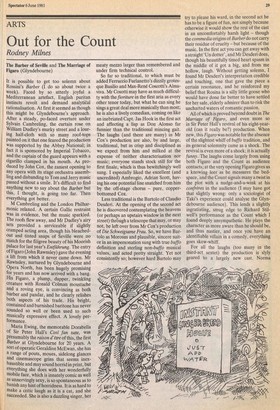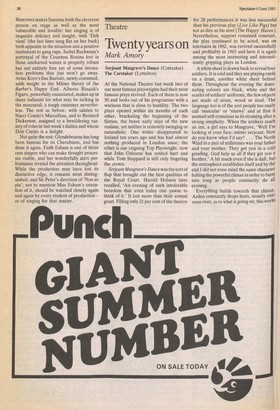ARTS
Out for the Count
Rodney Milnes
The Barber of Seville and The Marriage of Figaro (Glyndebourne) It is possible to get too solemn about Rossini's Barber (I do so about twice a week). Faced by so utterly joyful a Mediterranean artefact, English puritan instincts revolt and demand analytital rationalisation. At first it seemed as though this might be Glyndebourne's approach. After a steady, po-faced overture under Sylvain Cambreling, the curtain rose on William Dudley's murky street and a louring half-cloth with so many roof-tops painted on it that one feared the production was supported by the Abbey National; in fact it is sponsored by Imperial Tobacco, and the captain of the guard appears with a cigarillo clamped in his mouth. As produced by John Cox, the zaniest opening to any opera with its stage orchestra assembling and disbanding to Tom and Jerry music passed without a smile. It's difficult to find anything new to say about the Barber but this, I thought, is going too far. Then everything got better.
M Cambreling and the London Philharmonic relaxed. A certain Gallic restraint was in evidence, but the music sparkled. The roofs flew away, and Mr Dudley's airy sets provided a serviceable if slightly cramped acting area, though his bleachedout and tinted snaps of Seville were no match for the filigree beauty of his Moorish palace for last year's Entflihrung. The entry of Figaro (John Rawnsley) gave the evening a lift from which it never came down. Mr Raw`nsley, nurtured by Glyndebourne and Opera North, has been hugely promising for years and has now arrived with a bang. His Figaro, a plump, dapper, twinkling creature with Ronald Colman moustache and a roving eye, is convincing as both barber and pandar, and he clearly relishes both aspects of his trade. His bright, contained and burnished baritone has never sounded so well or been used to such musically expressive effect. A lovely performance.
Maria Ewing, the memorable Dorabella of Sir Peter Hall's Cosi fan tulle, was Presumably the raison d'être of this, the first Barber at Glyndebourne for 20 years. A sort of operatic Geraldine McEwan, she has a range of pouts, moues, sidelong glances and cinemascope grins that seems inexhaustible and may sound horrid in print, but everything she does with her wonderfully mobile face, which is innately comic as well as unnervingly sexy, is so spontaneous as to banish any hint of horridness. It is as hard to make a critic laugh as it is a cat, and she succeeded. She is also a dazzling singer, her meaty mezzo larger than remembered and under firm technical control.
So far so traditional, to which must be added Ferruccio Furlanetto's dizzily grotesque Basilio and Max-Rene Coseottes Almaviva. Mr Cosotti may have as much difficulty with the fioriture in the first aria as every other tenor today, but what he can sing he sings a great deal more musically than most; he is also a lively comedian, coming on like an inebriated Capt. Jas Hook in the first act and affecting a lisp as Don Alonso far funnier than the traditional mincing gait. The laughs (and there are many) in Mr Cox's production are also, by and large, traditional, but as crisp and disciplined as we expect from him and milked at the expense of neither characterisation nor music; everyone stands stock still for the first finale, which is thus bewitchingly well sung. I especially liked the excellent (and uncredited) Ambrogio, Adrian Scott, having his one potential line snatched from him by the off-stage chorus — pure, copperbottomed Cox.
Less traditional is the Bartolo of Claudio Desderi. At the opening of the second act he is discovered contemplating the heavens (or perhaps an upstairs window in the next street) through a telescope that may, or may not, be left over from Mr Cox's production of Die Schweigsame Frau. So, we have Bartolo as Morosus and plausible, sincere suitor in an impersonation sung with true buffo definition and sterling non-buffo musical values, and acted pretty straight. Yet not consistently so; however hard Bartolo may try to please his ward, in the second act he has to be a figure of fun, not simply because otherwise it would show the rest of the cast in an uncomfortably harsh light — though the commedia origins of Barber do not carry their residue of cruelty — but because of the music. In the first act you can get away with a straight 'Lin dotter', and Mr Desderi does, though his beautifully timed heart spasm in the middle of it got a big, and from me hollow, laugh. Without getting solemn, I found Mr Desderi's interpretation credible and touching, one that gave the piece a certain resonance, and he reinforced my belief that Rosina is a silly little goose who would have done far better to have settled for her safe, elderly admirer than to risk the uncharted waters of romantic passion.
All of which is proved beyond doubt in The Marriage of Figaro, and even more so in Sir Peter Hall's revival of his eight-yearold (can it really be?) production. When new, this Figaro was notable for the absence of the slightest whiff of buffo tradition, and its general solemnity came as a shock. The revival is even more of a shock; it is actually funny. The laughs come largely from using both Figaro and the Count as audience contacts; at the very opening Figaro gives us a knowing leer as he measures the bedspace, and the Count signals many a twist in the plot with a nudge-and-a-wink at his confreres in the audience (I may have got that slightly wrong: only a sociologist of Taki's experience could analyse the Glyndebourne audience). This lends a slightly ingratiating, smug edge to Richard Stilwell's performance as the Count which I found deeply unsympathetic. He plays the character as more aware than he should be, and thus nastier, and once you have an identifiable villain in a comedy, everything goes skew-whiff.
For all the laughs (too many in the third-act sextet) the production is slyly geared to a largely new cast. Norma Burrowes makes Susanna both the cleverest person on stage as well as the most vulnerable and lovable: her singing is of exquisite delicacy and insight, with 'Deh vieni' (the last lines sung flat on her back) both apposite to the situation and a positive incitement to gang rape. Isobel Buchanan's portrayal of the Countess Rosina lost in those uncharted waters is properly robust but not entirely free yet of some intonation problems that just won't go away. Artur Korn's fine Bart°lo, newly costumed, adds weight to the Milnes theory of the Barber's Happy End. Alberto Rinaldi's Figaro, powerfully enunciated, -makes up in sheer italianita for what may be lacking in the mercurial; a tough customer nevertheless. The rest as before, with salutes to Nucci Condo's Marcellina, and to Bernard Dickerson, assigned to a bewildering variety of roles in last week's dailies and whose Don Curzio is a delight.
Not quite the rest: Glyndebourne has long been famous for its Cherubinos, and has done it again. Faith Esham is one of those rare singers who can make thought processes visible, and her wonderfully alert performance riveted the attention throughout. While the production may have lost its distinctive edge, it remains most distinguished, and Sir Peter's direction of 'Non so piu', not to mention Miss Esham's execution of it, should be watched closely again and again by every student of production — or of singing for that matter.











































 Previous page
Previous page